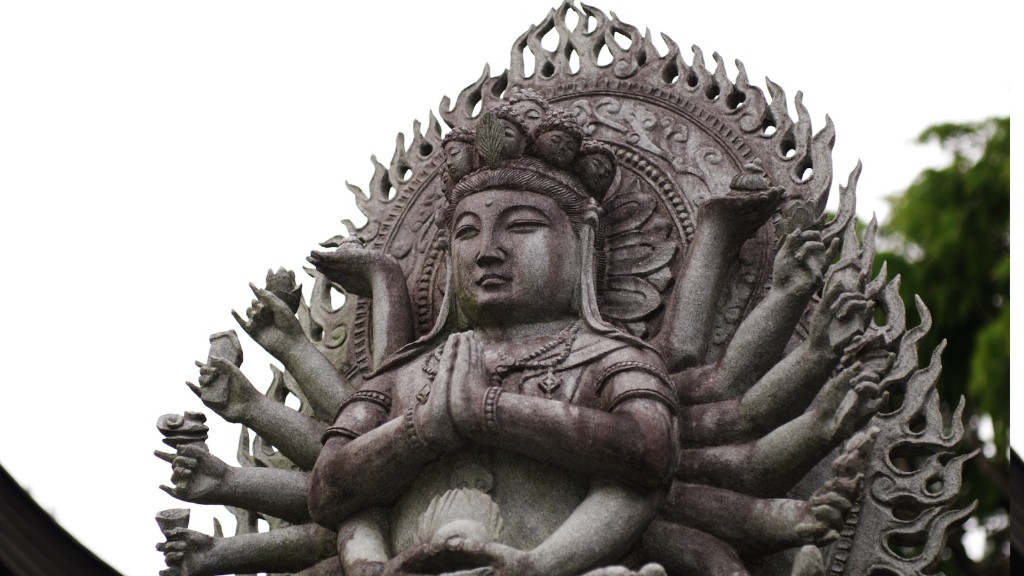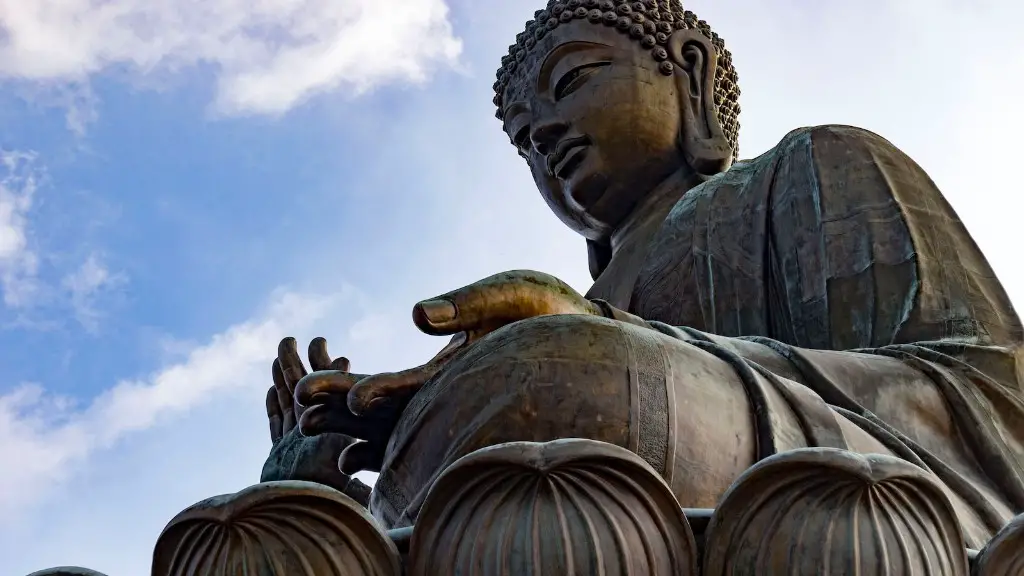Buddhism is one of the world’s oldest religions, dating back to the 6th century BCE. It is based on the teachings of Siddhartha Gautama, who is also known as the Buddha. Buddhism teaches that the way to salvation is through Nirvana, which is a state of enlightenment that can be achieved through meditation and ethical living. There are an estimated 500 million Buddhists worldwide, making it the fourth largest religion.
Buddhism is a religion that is based on the teachings of Siddhartha Gautama, who is also known as the Buddha. The main tenants of Buddhism are the Four Noble Truths, which are that life is suffering, that suffering is caused by attachment, that suffering can be ended by letting go of attachment, and that the way to let go of attachment is through the Eightfold Path.
What is the real meaning of Buddhism?
Buddhism teaches that the human life is one of suffering and that meditation, spiritual and physical labor, and good behavior are the ways to achieve enlightenment, or nirvana. In order to achieve nirvana, Buddhists must let go of their attachment to worldly things and desires. This can be a difficult process, but Buddhists believe that it is worth it in order to achieve peace and freedom from suffering.
Buddhist teachings state that there are divine beings called devas (sometimes translated as ‘gods’) and other Buddhist deities, heavens, and rebirths in its doctrine of saṃsāra, or cyclical rebirth. Buddhism teaches that none of these gods is a creator or an eternal being, though they can live very long lives.
What are the 3 main beliefs of Buddhism
Buddhism is a religion that is based on the teachings of Siddhartha Gautama. The main principles of this belief system are karma, rebirth, and impermanence. Buddhism teaches that we are all reborn after we die and that our actions in this life determine our circumstances in the next. This belief system also teaches that everything is impermanent and that we should not attachment to things because they will eventually disappear.
The goal of Buddhism is to become enlightened and reach nirvana. Nirvana is believed to be attainable only with the elimination of all greed, hatred, and ignorance within a person. Nirvana signifies the end of the cycle of death and rebirth.
Why do Buddhist not believe in god?
Buddhism is a tradition that is focused on spiritual liberation, but it is not a theistic religion. The Buddha himself rejected the idea of a creator god, and Buddhist philosophers have even argued that belief in an eternal god is nothing but a distraction for humans seeking enlightenment.
Buddhism is a religion that was founded by Siddhartha Gautama, also known as the Buddha, more than 2,500 years ago in India. With approximately 470 million followers, it is considered one of the major world religions by scholars. Buddhism teaches that the way to end suffering is to end the attachment to desires. Followers of Buddhism seek to live a life of compassion and wisdom.
Do Buddhists believe in heaven?
In Buddhism, there is no concept of punishment or reward and there is no divine being who decides who goes to hell or heaven There is merely the illusory results of our thought, words and deeds, which we call karma.
There are some high level Buddhists who have drawn analogies between Jesus and Buddhism. For example, in 2001, the Dalai Lama stated that “Jesus Christ also lived previous lives.” He added that “So, you see, he reached a high state, either as a Bodhisattva, or an enlightened person, through Buddhist practice or something like that.” Thich
Do Buddhists believe in afterlife
Buddhist teaching views life and death as a continuum, believing that consciousness (the spirit) continues after death and may be reborn. Death can be an opportunity for liberation from the cycle of life, death and rebirth.
The Buddhist monks have a very strict daily routine that revolves around meditation, study of scriptures and taking part in ceremonies. They live in Buddhist monasteries (Gompas) and their day starts very early in the morning. They start the day with meditation and then study scriptures. After that, they take part in various ceremonies and perform religious rites. In the afternoon, they again meditate and then take rest. In the evening, they attend more ceremonies and then retire for the night.
Does Buddhism believe in karma?
Buddhists believe that karma has implications beyond this life. Bad actions in a previous life can follow a person into their next life and cause bad effects (which Westerners are more likely to interpret as ‘bad luck’). Even an Enlightened One is not exempt from the effects of past karma.
The precepts are an important part of the Buddhist path to enlightenment. They are commitments to abstain from killing living beings, stealing, sexual misconduct, lying and intoxication. By following the precepts, we develop our mind and character and make progress on the path to enlightenment.
What is the ultimate goal for most Buddhist
The Theravada tradition follows the path to Nirvana, the liberation from cycles of rebirth. In the Mahayana tradition, the highest goal is Buddhahood, in which there is no abiding in nirvana. Buddha helps liberate beings from saṃsara by teaching the Buddhist path.
Ethical behavior is important because it leads to an enlightened mind. When we are ethical, we are able to see the world more clearly and make better decisions. We become more focused and present, and we are able to connect with others in a deeper way. We also become better role models for others, and we inspire them to be more ethical as well.
Do Buddhists celebrate Christmas?
Christmas is a joyous occasion for many Buddhists, despite what some people may think. Three-quarters of Asian American Buddhists celebrate the holiday, and many observe Bodhi Day on December 8th as well. This day marks the Buddha’s moment of enlightenment, and is a time for giving thanks andreflecting on one’s own journey. Buddhists believe that the holiday season is a time to come together and celebrate our shared humanity. So if you see a Buddhist celebrating Christmas, don’t be surprised – it’s just another way to show love and compassion for all.
Buddhavacana texts are those that are attributed to the Buddha himself, and are seen as his direct teachings. These texts are highly respected by Buddhists and are seen as part of the Buddha’s Dharma. The concept of buddhavacana is important in understanding how Buddhists see their texts, as it helps to classify and give importance to certain texts over others.
What is Buddhism vs Christianity
Buddhism and Christianity are two very different religions. Buddhism is a nontheistic religion that does not believe in a Creator God, while Christianity is a monotheistic religion that believes in one Almighty God. Christian values are based on God’s divine will, while Buddhist values are based on the Four Noble Truths. Buddhism also teaches that suffering is caused by desire, while Christianity teaches that suffering is caused by sin.
Buddhists believe in karma and reincarnation to the point of ceasing to exist. This is the chief aim of Buddhists and is called Nirvana, an enlightened state that is free from desire. Nirvana is achieved by continually seeking and eventually accomplishing self-perfection.
Conclusion
Buddhism is a religion and philosophy originating in India. The word Buddhism comes from ‘budhi’, meaning ‘to awaken’. It teaches people how to end their suffering by cutting out greed, hatred and ignorance.
Overall, Buddhism is a religion that is based on the teachings of the Buddha. It is a religion that emphasizes compassion, peace, and love.




